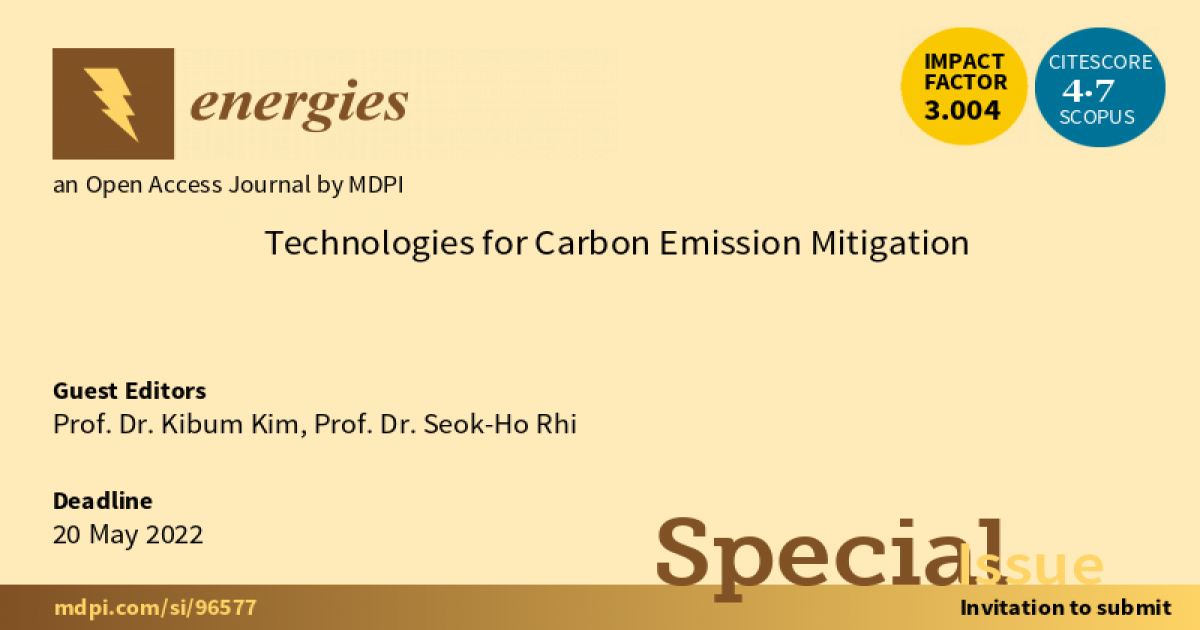- 3.2Impact Factor
- 7.3CiteScore
- 17 daysTime to First Decision
Technologies for Carbon Emission Mitigation
This special issue belongs to the section “B3: Carbon Emission and Utilization“.
Special Issue Information
Dear Colleagues,
Recently, interest in reducing carbon dioxide (CO2) emissions has increased and regulations have intensified. Tremendous efforts are made to reduce CO2 emissions via fundamental and applied research. CO2 emissions can be mitigated by improving the thermal efficiency of internal combustion engines. Innovation of thermodynamic cycles, for example, cogeneration, organic Rankine, and combined cycle with waste heat recovery, leads to higher thermal efficiency. In addition, technologies for sequestrating or converting are emerging to suppress CO2 accumulation in the atmosphere. While reducing fossil fuel dependency, renewable energy technologies also offer an indirect technical solution to CO2 emissions.
The contribution of these technologies to CO2 mitigation is definitely remarkable, but more effort still needs to be expended until the concentration of CO2 in the atmosphere is sustainable. With such a goal in mind, this Special Issue aims to collect original research or review articles on various technologies conducive to reducing greenhouse gas emissions. The scope of the issue is broad and not limited to the topics mentioned above. Any research topic contributing to greenhouse gas mitigation will be considered.
Prof. Dr. Kibum Kim
Prof. Dr. Seok-Ho Rhi
Guest Editors
Manuscript Submission Information
Manuscripts should be submitted online at www.mdpi.com by registering and logging in to this website. Once you are registered, click here to go to the submission form. Manuscripts can be submitted until the deadline. All submissions that pass pre-check are peer-reviewed. Accepted papers will be published continuously in the journal (as soon as accepted) and will be listed together on the special issue website. Research articles, review articles as well as short communications are invited. For planned papers, a title and short abstract (about 250 words) can be sent to the Editorial Office for assessment.
Submitted manuscripts should not have been published previously, nor be under consideration for publication elsewhere (except conference proceedings papers). All manuscripts are thoroughly refereed through a single-blind peer-review process. A guide for authors and other relevant information for submission of manuscripts is available on the Instructions for Authors page. Energies is an international peer-reviewed open access semimonthly journal published by MDPI.
Please visit the Instructions for Authors page before submitting a manuscript. The Article Processing Charge (APC) for publication in this open access journal is 2600 CHF (Swiss Francs). Submitted papers should be well formatted and use good English. Authors may use MDPI's English editing service prior to publication or during author revisions.
Keywords
- CO2 emission
- CO2 mitigation
- greenhouse gas mitigation
- waste heat recovery
- carbon capture and sequestration
- carbon capture and utilization
- cogeneration
- organic Rankine cycle
- renewable energy

Benefits of Publishing in a Special Issue
- Ease of navigation: Grouping papers by topic helps scholars navigate broad scope journals more efficiently.
- Greater discoverability: Special Issues support the reach and impact of scientific research. Articles in Special Issues are more discoverable and cited more frequently.
- Expansion of research network: Special Issues facilitate connections among authors, fostering scientific collaborations.
- External promotion: Articles in Special Issues are often promoted through the journal's social media, increasing their visibility.
- e-Book format: Special Issues with more than 10 articles can be published as dedicated e-books, ensuring wide and rapid dissemination.

